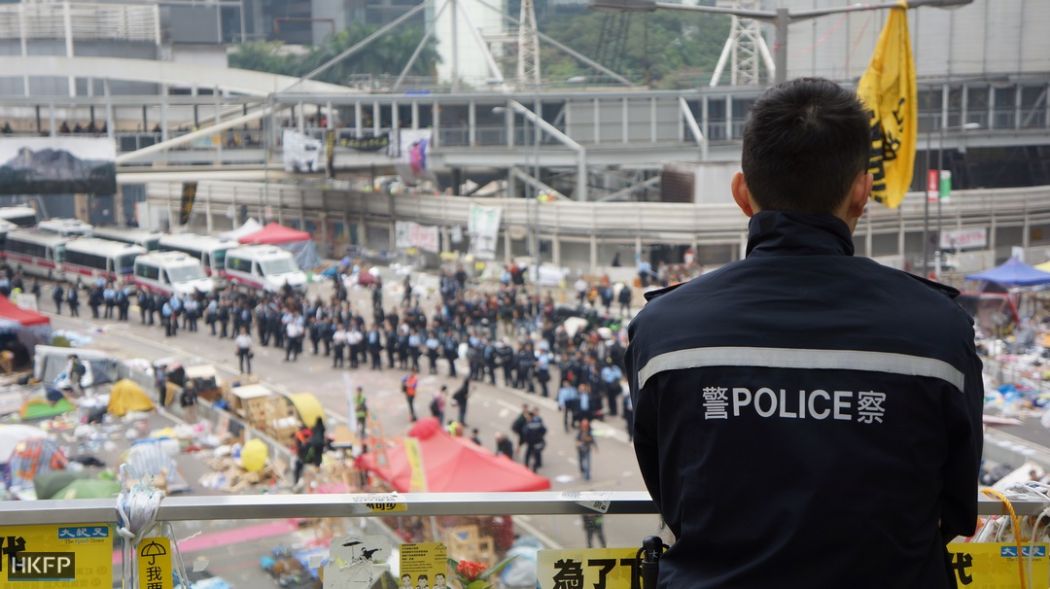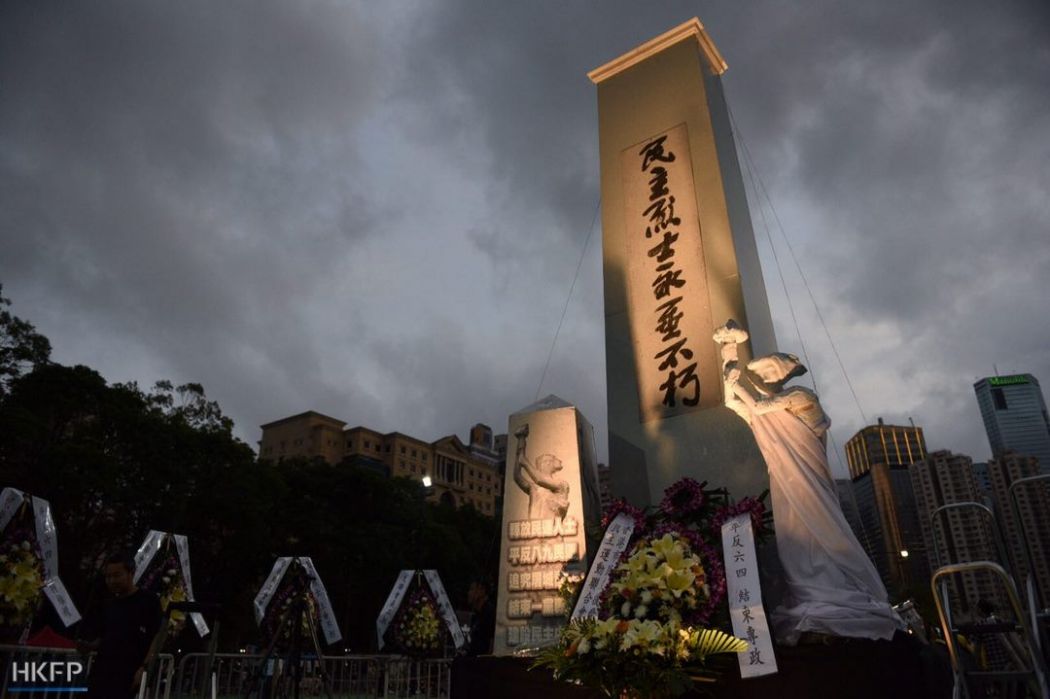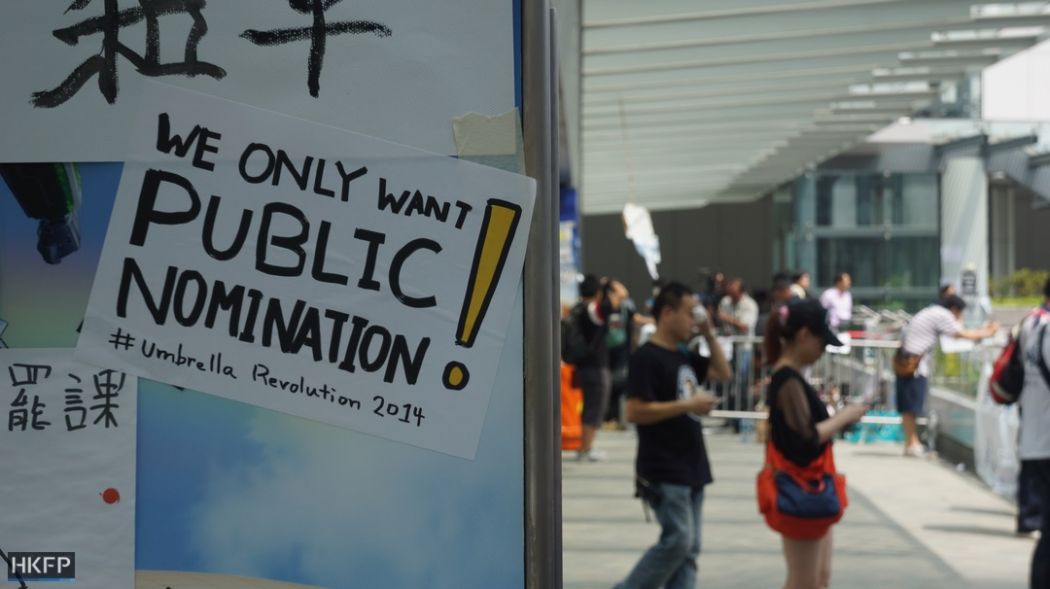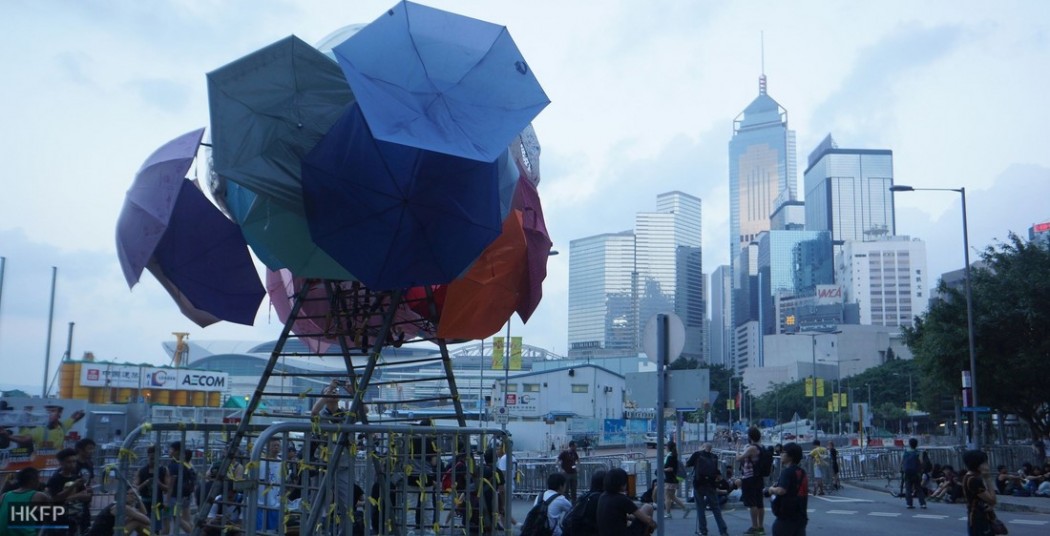Not long after the end of the occupations in December 2014, I started to hear participants say things like, “We accomplished nothing.” Most though not all of these voices belonged to young people.
I was a bit taken aback because during the occupations, most occupiers had quite realistic expectations. No one thought the Communist Party was suddenly going to see the light and hand genuine universal suffrage to Hong Kong on a platter. Why, then, this downbeat assessment afterwards?

After so many had fought so long and hard, camping out on the streets for 79 days, being teargassed, peppersprayed, beaten and arrested by police, the bitterness was understandable:
It’s one thing to know something in your head, another to feel it deep in your heart. In the aftermath of the Umbrella Movement, it was dawning on many Hong Kong people, especially young people, just how deeply unjust their society was.
They were coming to terms with the “nature of the beast”, the Communist Party, their implacable adversary which had spent over 60 years jealously guarding its monopoly on power on the mainland, annihilating any challenge to it.
Existing as they did a step removed from the full force of that power, a good many Hong Kong people hadn’t fully understood the Communist Party. But they did now. Or it was dawning on them with awful clarity.
Accompanying this growing awareness of injustice and of the ruthlessness of the oppressor was a deep sense of powerlessness. Much of the disillusionment turned inward: people were disappointed with themselves and with the leaders of the occupations.
But while emotionally understandable and partially accurate, the assessment that the Umbrella Movement accomplished nothing disregards a wide array of positive outcomes, both intended and not. Some can be classified as objectives met others are perhaps more like side effects.

A fuller understanding of what the movement was about, what it did and did not accomplish, is, among other things, useful in strategizing for the future.
In one sense, “We accomplished nothing” is right: The Communist Party made no concrete concessions nor even exhibited a willingness to engage, let alone negotiate. The Umbrella Movement did not lead to genuine universal suffrage. On the surface, it did not force the Party to budge an inch.
The Umbrella Movement’s lack of accomplishment of any concrete immediate positive objective was not dissimilar to the cases of many other recent nonviolent popular movements and uprisings going back to the huge global demonstrations against the invasion of Iraq in 2003 and up through the Occupy movement and the Arab Spring.
These movements were all different from one another, but a clear pattern is emerging: It’s become harder for nonviolent political movements to accomplish concrete positive objectives in the short term.
But there is a difference between acknowledging the fact that the key positive objective of genuine suffrage hasn’t been accomplished and saying that nothing has been.
Before outlining the movement’s main accomplishments and failings, it’s important to consider a few important contexts.
The Umbrella Movement was the largest manifestation of resistance to Communist Party rule since the 1989 demonstrations across China. While the ’89 demonstrations were violently crushed, the Umbrella Movement fought the Communist Party to a draw: Neither was able to achieve its primary aim (for the movement, genuine suffrage; for the Party, fake).

Once the Communist Party came out with its decision of 31 August 2014 that virtually ruled out genuine universal suffrage, it committed itself irrevocably to taking a hard line on Hong Kong. From that point on, it could not show the least bit of “weakness”.
This hardline stance is a Communist specialty, and more so than ever under Xi Jinping. It is similar to Party policy on Taiwan, Tibet and Xinjiang, which in turn is based on an awareness that the Communist empire is contested at its peripheries.
Indeed, from the Tibetan uprising of 2008 to unrest in Xinjiang to the Sunflower Movement of Taiwan and the Hong Kong Umbrella Movement of 2014, we see a clear pattern of resistance to Party rule, or in the case of the Sunflower Movement, Party influence.
In all of these places, the party doesn’t get the loyalty and obedience it wants. And whenever people rise up, its reflex is repression: it’s backed itself into a corner with its hardline policies.
Of course, the underlying reason for this is that it rules by force and without the formal consent of any of its people. So if you think the Umbrella Movement failed, just look at the messes the Party has made for itself all over its empire.
From 31 August 2014 onward, then, it was fairly certain what the Party response would be to any mass resistance in Hong Kong. Indeed, resort to use of the military was more likely than substantial concessions.

Also important is that the occupations began spontaneously as a form of resistance rather than as an expression of a positive demand. They were first and foremost a big NO to the eight-hour-long police teargas attack on Hong Kong citizens on 28 September and to the fake suffrage stipulated in the 31 August ruling.
Of course, demonstrators desired genuine suffrage; that was their primary positive objective. But they also wished to block the worst, fake suffrage, from happening, and in this, they succeeded.
The Umbrella Movement torpedoed any chance of a Hong Kong government proposal based on the 31 August ruling ever passing in Legco. Sure enough, the Communist Party’s fake suffrage was defeated on 18 June 2015.
If “We accomplished nothing” is true, the same can be said for the Communist Party. Fake suffrage was an important part of the Party’s plan to bring Hong Kong under its full control long before 2047. With fake suffrage, the Party would have achieved a complete and final stranglehold over the formal political system.
It called what it was proposing “universal suffrage”, so it would also have been relieved of the legal obligation enshrined in the Basic Law to introduce it. It would have been under no further legal obligation to allow any subsequent political development in Hong Kong whatsoever.
Fake suffrage was checkmate. For this reason, defeating fake suffrage, while a long way from achieving the realisation of genuine suffrage, was a crucial accomplishment. It also fulfilled the original objective of the demonstrators, to say no.

In this sense, judging by the criterion of the spontaneous motivation to come out to the streets on 28 September, the Umbrella Movement accomplished its primary objective. Indeed, whenever Hong Kong people have had the power to do so — Article 23 “security” legislation in 2003, the national education curriculum in 2012, the fake suffrage of 2015 — they have consistently thwarted the Communist Party’s efforts to exert greater control over Hong Kong.
The Umbrella Movement can be considered to have “failed”, to have “accomplished nothing” only if it is regarded as the climax of a campaign, rather than part of a much longer history of political struggle which began long before the movement and will continue far into the future. In that broader context, the accomplishments of the Umbrella Movement were various and profound:
It drew much greater attention, both in Hong Kong and internationally, to the Communist Party’s stepped-up efforts at mainlandization (political control coupled with infrastructural, economic and cultural integration of Hong Kong with the mainland) and brought Hong Kong’s political situation to the attention of the rest of the world in a way that no other event had ever done before, establishing Hong Kong as contested political territory.
It brought Hong Kong to a new stage in the struggle for democracy and self-determination, initiating an era of long-term resistance, cultivating a deep and healthy distrust of the Communist Party that pervades greater swathes of Hong Kong society than ever before, and, with that, increased vigilance.
It did more than any other event to promote a politically conscious and active citizenship, and this especially amongst a huge majority of young people — upwards of 80 to 90 percent — who are in favor of democracy and genuine autonomy.
This resistance is a factor that the Party will have to contend with for years and perhaps even generations to come; indeed, it could outlast the Party itself. It is not going too far to say that the fate of Hong Kong rests on what this generation of young people decides to do.

It raised the political awareness of Hong Kong people generally, and especially that of many previously apolitical people. They realized how emotionally attached to Hong Kong they are. They strongly identify with it and want to defend it.
It got people talking politics and thinking about the future of the city. It made more people aware of Hong Kong’s many deficits, of the failings of its government, and the relationship between the city’s drawbacks and the fact that it lacks democracy. And it motivated a larger number of people than ever to stand up for themselves and for Hong Kong.
It made Hong Kong less submissive, less controllable. As Jacques Semelin said in reference to civil resistance to Hitler in occupied Europe, “When a society feels less and less submissive, it becomes more and more uncontrollable. Then even if the occupier keeps its power, it loses its authority.” That’s Hong Kong today.
The Umbrella Movement delegitimized Communist Party rule and made people see more clearly than ever before what the Party was doing to Hong Kong. What government can fail to respond to such a huge number of its citizens in such great open rebellion that they take over large parts of the city for months, and retain even vestigial legitimacy?
Because of the unfulfilled promise of universal suffrage, Hong Kong was already in perpetual political crisis before the Umbrella Movement, but the movement made the contradictions and injustices of Party rule even more acute. And the only way the Party knew how to respond, doing nothing to reform and instead tightening the screws, has simply discredited it further.
This model of governance — an essentially unelected government whose first priority is to implement the agenda of the Communist Party in a city of citizens aware of and demanding their rights — is simply unsustainable, however stable it may sometimes appear on the surface.
Related to the above, the movement specifically doomed Chief Executive Leung Chun-ying and his administration to illegitimacy and ineffectuality.
One of the first and most concrete demands the movement made was that Leung resign to take responsibility for failed political reform and the police teargas attacks. I recall clearly at the time many long-time China watchers scoffed at the idea that the movement could force the Party to dump Leung.

Oh, I said to them, it may not come now, but it will come. Remember Tung Chee-hwa? He was actually the first CE whose reign was terminated due to a people’s movement, the half-million-person march in 2003 against the Party-directed Article 23 “security” legislation.
Tung resigned for “medical reasons” in 2005. In 2016, Leung decided not to run for a second term for “family reasons”. He had rendered himself so unpopular by doing the Party’s dirty work that the Party dumped him. Both had their reigns shattered by people’s movements against Party attempts to impose its will.
The only CE to complete his two allotted terms so far is Donald Tsang, and he was subsequently convicted of corruption and sentenced to prison for crimes committed in office. There’s no greater indictment of the Hong Kong governance model than the fact that even in a system where the CE is basically appointed, he still cannot complete two terms.
The Umbrella Movement was an ultimatum to the Communist Party: Either you give us what you promised, or all bets are off; the implicit social contract of the last 17 years, according to which we grudgingly went along with your rule in exchange for you fulfilling your promise of allowing real autonomy and granting genuine suffrage, is torn up and we start from scratch. We will no longer wait around for you to deliver, we will take our fate into our hands.
There is a growing awareness that it is the Basic Law itself that is problematic (or the Party’s interpretation of it, which amounts to the same thing), and fewer people will accept it as the basis of a just political solution. Indeed, the suffrage struggle led to today’s calls for self-determination and independence.
The Umbrella Movement brought into relief two clearly contrasting sets of values, those of Hong Kong and the pro-democracy movement, on the one hand, and the Communist Party’s authoritarian political culture, on the other.
It provided a vision of just what a better place Hong Kong could be — fairer, more egalitarian, more communitarian, more vibrant, caring, generous and creative, happier, and of course, more democratic.
This vision stands in stark contrast to what the Party wants it to be — authoritarian, rigidly hierarchical, inegalitarian, docile, passive, prostrate, obedient, plodding, cutthroat capitalistic and exploitative, resigned and pessimistic. For the Party, the model Hong Kong citizen is the dull and unswervingly loyal Hong Kong government political appointee, who can’t think for himself, but is good at executing orders.
The Umbrella Movement vision is a template for a different sort of society, not governed by the dictates of authoritarian turbo-capitalism with political and economic power concentrated in the hands of a tiny minority.

The movement’s art, creativity, anarchic collaboration, egalitarianism, communalism, emphasis on values other than the economic, idealism, generosity of spirit and action, dedication, commitment to the common good, to ideals higher than oneself, one’s pocketbook, one’s family, opened Hong Kong people’s eyes to one another, to a common identity both already existing and still emerging, and to the possibilities of a truly self-governed, democratic Hong Kong.
This heartened people and gave them confidence in themselves, their comrades, their allies, the better angels of Hong Kong’s nature. People who participated in and were inspired by the occupations continue to resist and to fight for justice in ways big and small, as a movement, in groups and as individuals in many areas of society. They carry the flame of the movement deep in their hearts.
The Umbrella Movement dealt a blow to the international reputation of the Communist Party, as it became clear that it had no intention to fulfill its legal obligations.
While the Party exercises greater economic and military influence globally than ever before, its “soft power”, its ability to inspire any kind of affinity based on the attraction of its system as a political model and of its society as a cultural model is close to zero.
The Umbrella Movement smashed any hope the Communist Party may have had that Taiwan would ever willingly reconcile with the mainland as it is now ruled. The last thing Taiwanese want is to become like Hong Kong.
The Umbrella Movement accomplished all of the above nonviolently and with courage and dignity in the face of violent attacks by the police and thugs. It preserved the moral upper hand. It showed that nonviolent resistance is, among other things, the most sustainable option, working as a platform for future action, even if it doesn’t immediately lead to the fulfilment of the most desired objectives.

That list of accomplishments and successes is far from everything but it is certainly more than nothing.
But then what were the movement’s failures and limitations? What were the main reasons it was not able to accomplish its primary positive objective of genuine suffrage?
Simply put, it didn’t have enough power to force the Communist Party to grant it.
Why didn’t it have enough power? There are three main reasons: It didn’t have enough people, it hadn’t the capacity to “escalate outward” effectively, and it failed to convince supporters of the Party to withdraw their support or defect to the other side.
Estimates for participation in the occupations themselves range from 836,000 to 1,300,000. That’s between 13 and 20 percent of the 6,401,600 Hong Kong people over the age of 15. In addition to that, there were the nearly 800,000 who voted in the Occupy Central with Love and Peace referendum on universal suffrage of 22 to 29 June 2014 and the 510,000 who marched on 1 July that year.
In all, in events ranging from the 22–29 June 2014 OCLP referendum to the defeat of fake suffrage in June 2015, an estimated 2,156,000 to 2,620,000 people participated — an astounding 33 to 40 percent of the over-15 population. Even if one assumes that many people participated in all events, the referendum, the march and the occupations, that is still an extraordinary participation rate.

Scholar of nonviolent resistance Erica Chenoweth says that almost any movement with a participation rate of 3.5% is likely to succeed. The Umbrella Movement far exceeded that. But still, that was not enough.
Too many Hong Kong people, for whatever reason, decided not to get involved at a historically crucial moment. This was indeed a weakness, but not really one for which the movement itself could be blamed.
Or one could argue that indeed enough people participated but those huge numbers could eventually be contained because of the movement’s biggest internal weakness, its inability to “escalate outward” when the moment demanded.
It couldn’t expand the movement beyond street occupations. Past a certain point, it was insufficient just to have people in the streets or even to use those people to, for example, surround government buildings.
The problem was that, going into the movement, which, again, began spontaneously, the pro-democracy movement and civil society generally were organizationally too weak and without the requisite culture to accomplish outward escalation. That would have meant, for example, labour union strikes, rent strikes of public housing tenants, and economic boycotts of entities supporting the Communist Party.
Imagine, for instance, if teachers, bus drivers and MTR train drivers went on strike. Both the Confederate of Trade Unions and the Professional Teachers Union called strikes in response to the police tear gas attacks of 28 September, but little came of them.

Traditionally, the pro-democracy movement had been weak at organizing, and it showed in the Umbrella Movement, when it needed to be able to call on a base of already-organized people to mobilize in different areas of society.
As a result of the movement’s inability to escalate outward, the Communist Party was reassured after the first week or so that it could be contained, and thus it and the Hong Kong government adopted the strategy of simply waiting it out.
The movement’s other big weakness was an inability to get supporters of the regime to either defect or withdraw their support. Most nonviolent resistance movements that succeed are able to persuade the security apparatuses protecting the regime or the business elements that see themselves as benefitting from it to calculate that they’d be better off no longer supporting it.
Loyalist defections are identified by nonviolent resistance scholars as amongst the most decisive turning points. But no one amongst the tycoons and business establishment, the pro-Party media, Hong Kong government political appointees or civil service or the police, let alone the Communist Party’s army or mainland Chinese citizens changed sides or even withdrew support.
Again, this had the effect of reassuring the Communist Party that it could wait the movement out since it wasn’t eroding support amongst its allies.
There were other weaknesses- in leadership, strategy, communication, coordination and decision-making- but these were not of decisive significance, nor was the fact that the movement received no significant moral or rhetorical support from foreign governments.

Weighing all of the above, the conclusion is that there was little else the Umbrella Movement might have accomplished, considering the circumstances, and that what it did accomplish was of great significance. It was a watershed of Hong Kong history. Its legacy will be felt for years to come.
Indeed, we are living in the post-Umbrella Movement era: Virtually every significant political development in Hong Kong since then has its origins in the movement or reactions against it.
Unfortunately, the assessment that “we accomplished nothing” has led to wrong lessons being learnt. In the aftermath of the movement, there were recriminations and disunity amongst various factions within the pro-democracy movement which should have, over the past three years, been collaborating and cultivating a sense of common purpose.
The underlying weakness of an insufficiently organised civil society generally and pro-democracy movement in particular has not been addressed. Much of the deep pessimism that can easily be found amongst activists and others in Hong Kong these days might also be tempered by greater confidence in our own power.
Pessimism risks becoming fatalism or defeatism or resignation, which is exactly what the Communist Party wants. When it comes to power, the Party sees everything as a zero-sum game; its goal is the absolute annihilation or submission of the enemy. Don’t do the Party’s work for it.
The real lessons to be learned from the Umbrella Movement are the need for unity and solidarity amongst all those in Hong Kong who want democracy and self-determination, and the importance of addressing the pro-democracy movement’s underlying weaknesses in strategy, organisation and mobilisation.
For Hong Kong, there is always hope as long as people continue to resist, especially if they do so in unity and solidarity and with a clear goal and plan to achieve it.
This article is the second in a 5-part series on the Umbrella Movement three years after its beginning on September 28, 2014. The first article is “Why I wrote ‘Umbrella’, a 600-page account of the Umbrella Movement”. Kong Tsung-gan is the author of Umbrella: A Political Tale from Hong Kong. He envisions a day when September 28 will be Hong Kong’s national day and “Raise Your Umbrellas” its national song.
